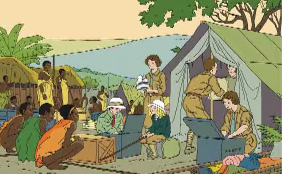As this was the wet season, each afternoon a black storm-cloud would come rolling along, and for a little while there would be a great downpour of rain. After that the sun would come out brightly again.
当时正值湿季,每天下午黑色的暴风云滚滚而来,接着就是倾盆大雨。大雨过后太阳出来,依旧阳光灿烂。
The African mornings are as black as night, for it is always dark until the sun gets up.
非洲的早晨漆黑如夜,因为在太阳升起之前它总是黑的。
Then the light comes all at once, as if you pulled up a window shade and let in the bright sunlight. In central Africa the sun always rises at six in the morning, and sets at six in the evening; so no one in Alice's party needed a watch to tell him the time at sunrise or sunset.
然后天一下子就亮了,就像你拉起百叶窗,让明媚的阳光进来了一样。在中非,太阳总是在早上六点升起,晚上六点落下;所以爱丽丝一行人中,没有人需要手表来辨别日出或日落的时间。
Sometimes at four o'clock in the morning, sometimes even at three, Alice would find herself being pulled out of her warm blankets and hurried into her clothes. The tent was chilly and lighted only by a candle.
有时是凌晨四点,有时甚至是三点的时候,爱丽丝就会发现自己被从温暖的毯子里拉出来,匆忙地穿上了衣服。帐篷里很冷,而且只有一支蜡烛来照明。

The tent boys would come running in with hot water just about the time everybody had had a hurried wash with cold water.
当每个人都匆匆地用冷水洗完脸后,帐篷男孩们就会端着热水冲进来。
Alice would give her hair a hasty brushing, pull on her sweater, and run out to the breakfast table, which was set outside the tents.
爱丽丝会匆匆梳理一下头发,穿上毛衣,跑到帐篷外面的早餐桌旁。
Candles would be burning, and in the darkness the boys who helped with the cooking would be running back and forth from the kitchen fire, bringing hot prunes and cereal and toast and bacon and coffee.
蜡烛会一直燃烧着,黑暗中,帮助做饭的男孩们跑来跑去,他们从厨房的炉火上拿来热腾腾的梅干、麦片粥、烤面包、培根和咖啡。
Behind the breakfast table other boys were putting out the bags and taking down the tents.
在早餐桌的后面,其他男孩正整理包裹,并把帐篷拆掉。
Eagerly the natives would watch the white people eat. They had no wish for the white man's food, but, oh, how they watched the big tin cans from which the milk and jam and biscuits came!
土著人热切地看着白人吃饭。他们不是希望得到白人的食物,而是盯着装牛奶、果酱和饼干的大锡罐。













